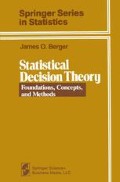Abstract
The invariance principle is an intuitively appealing decision principle which is frequently used, even in classical statistics. It is interesting not only in its own right, but also because of its strong relationship with several other proposed approaches to statistics, including the fiducial inference of Fisher (1935), the structural inference of Fraser (1968), and the use of noninformative priors. Unfortunately, space precludes discussion of fiducial inference and structural inference. Many of the key ideas in these approaches will, however, be brought out in the discussion of invariance and its relationship to the use of noninformative priors. The basic idea of invariance is best conveyed through an example.
Access this chapter
Tax calculation will be finalised at checkout
Purchases are for personal use only
Preview
Unable to display preview. Download preview PDF.
Author information
Authors and Affiliations
Rights and permissions
Copyright information
© 1980 Springer Science+Business Media New York
About this chapter
Cite this chapter
Berger, J.O. (1980). Invariance. In: Statistical Decision Theory. Springer Series in Statistics. Springer, New York, NY. https://doi.org/10.1007/978-1-4757-1727-3_6
Download citation
DOI: https://doi.org/10.1007/978-1-4757-1727-3_6
Publisher Name: Springer, New York, NY
Print ISBN: 978-1-4757-1729-7
Online ISBN: 978-1-4757-1727-3
eBook Packages: Springer Book Archive

